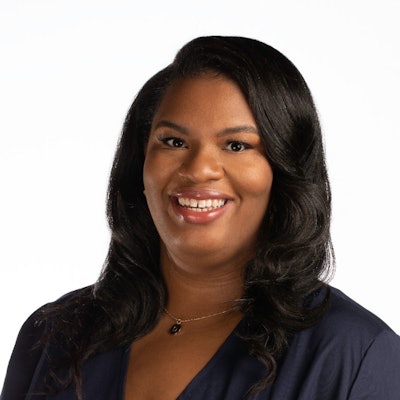 Danielle McConnell
Danielle McConnell
Before the pandemic, “students were already challenged to buy groceries, make ends meet, to pay for hospital bills,” said Danielle McConnell, director of program at One Million Degrees (OMD). “Our program was set up to provide those wraparound supports, to always think creatively about how to support students financially.”
OMD created an emergency fund of roughly $150,000, through which they were able to directly support about 300 students. One of those students was Noale Peacock, who used her pandemic payment for groceries and wireless, a necessity for all-virtual learning environments.
OMD offers last-dollar scholarships, up to $1,000 per student per year. Peacock had previously used any stipend she received to save for her educational future, but COVID-19 changed that. It wasn’t just the financial support that made a difference during the pandemic. In fact, when Peacock originally applied to join OMD, she had no idea OMD offered stipends.
“My favorite thing,” said Peacock, “is having my own advisor.”
That advisor, or coach, is one of currently 493 volunteers with OMD. Coaches are purposefully paired with students after an interview process. Often, they work in careers that the student wishes to enter. These coaches reach out and call students before midterms, after midterms, and listen and speak as mentors to the college experience.
OMD was created in 2006 as a way to directly address persistence and retention at Chicago’s community colleges. At the time, the three-year graduation rate of these two-year schools was 7%. In the fifteen years since their inception, that graduation rate has almost tripled to just under 20%. OMD now has a case manager at every City College of Chicago campus and beyond. They work with community colleges in the suburbs outside Chicago, and in April of this year partnered with Colorado Department of Education in Adams County to increase wraparound supports specifically for adult students.
Mentorship is just one the many supports that OMD offers to its students. There are monthly emails informing students of new learning opportunities, monthly meetings (now virtual) that walk students through the nuances of job applications, how to better communicate with others, and offer advice on setting lifegoals. OMD is partnered with national organizations like Dress for Success to help create opportunities for students they may not have had before.
Becoming an OMD student goes beyond academic performance. OMD officials said that they want to work with students who are highly motivated to graduate. Whether they continue on to get their bachelor’s degree or go straight into the workforce is entirely up to them.
OMD works with 743 students in Chicago. But, since OMD has been involved in Chicago’s schools for fifteen years, it feels as though every student has benefitted, said Veronica Herrero, chief of staff and chief strategy officer at City Colleges of Chicago.
At monthly meetings in each City College of Chicago campus, the case manager for OMD students shares information, working to make sure their student's needs are heard. That presence has made an “influence on the system,” said Herrero, that has helped create a “caring culture, to create a better sense of belonging” for students.
 Veronica Herrero
Veronica Herrero
“We had emergency dollars available through stimulus funds and private dollars, but for our students it just wasn’t enough,” said Herrero. “OMD provided them with additional emergency grants, coaching, and one on one attention.”
OMD coaches keep the students motivated to stay in school. That kind of one-on-one interaction simply isn’t feasible for the City Colleges of Chicago alone.
“[OMD]’s case managers work with a group of about 65 students, which is really wonderful,” said Herrero. “Those are ratios that we just can’t afford to have. We’ve got resources and programs for them, but we don’t have the resources to make sure students are taking advantage of them.”
This can be particularly impactful for first-generation students, who made up 64% of this year's graduates of the City Colleges of Chicago.
While OMD looks to expand its operations nationally, McConnell said that the work isn't quite done in Chicago.
“It’s very important to continue to build our model and adapt and refine, but we’re [excited] to go abroad to show why wraparound support services are important for student success and the global economy,” she said.
For Martina Enriquez, the support OMD provided made the difference. She worked closely with her coach, attended every virtual seminar she could, and poured over every OMD email. She’s hoping to graduate this coming spring, and she will go on to double major in marketing and finance.
“I was lost before [OMD]," she said. "I didn’t have the full support to finish my education. So, just being able to join a program that makes me feel like I’m valuable, that’s worth the experience.”
Liann Herder can be reached at [email protected].
















